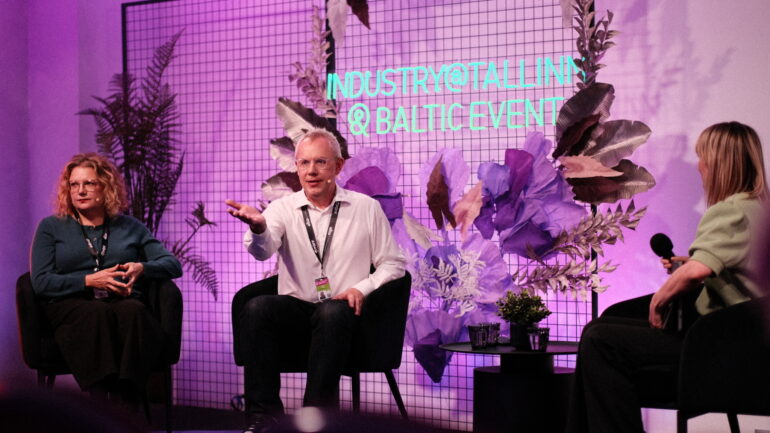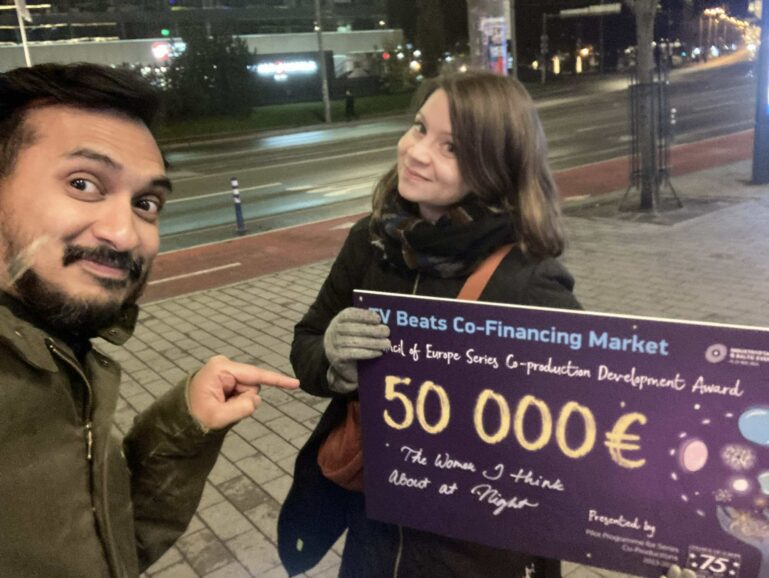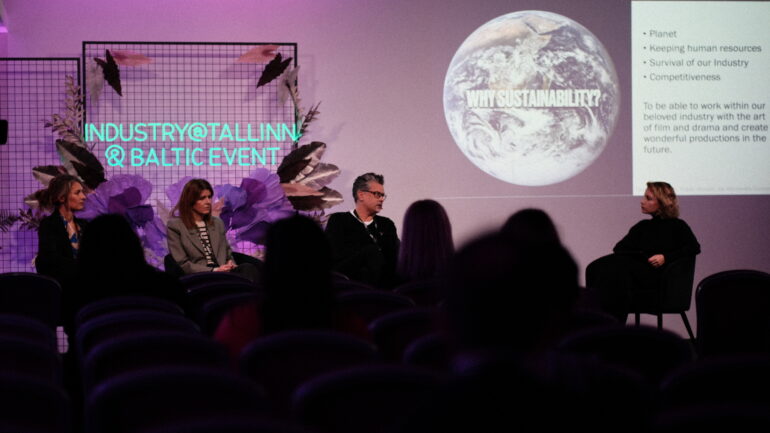WRITTEN BY: Davide Abbatescianni
Multiple industry awards, and Nordic professionals showcasing their expertise.
It’s a wrap for the 28th edition of the Tallinn Black Nights Film Festival, which unspooled in the Estonian capital from 8 to 24 November. This year saw the triumph of a Mongolian pic, Sengedorj Janchivdorj’s Silent City Driver, which scooped the Grand Prix, and the much-chatted-about Steve Bache’s No Dogs Allowed (Germany), a brave debut tackling the taboo subjects of paedophilia and online grooming.
Although it didn’t receive any accolades, another film sparked great debate at the festival: Boris Guts’ latest effort, Deaf Lovers, a co-production between Estonia and Serbia. Initially showcased in the main competition and included in the Standing with Ukraine programme, the independently funded film revolves around the encounter between a Russian man and a Ukrainian woman in their twenties, both of whom have escaped the war by fleeing to Istanbul. On 13 November, in response to criticism from Ukrainian filmmakers, the festival highlighted that Guts left Russia after the outbreak of full-scale war and now lives as a refugee in Serbia, repeatedly speaking out against the war in Ukraine and Putin’s regime. The team removed the film from the Standing with Ukraine programme but kept it in competition, billing it as “an artistically powerful anti-war work that reaches into figurative language.” The backlash came before the film’s world premiere on 17 November.
Zooming in on this year’s Nordic wins, the prize for Best Director in the Critics’ Picks section went to Dechen Roder’s I, the Song, a co-production by Norway’s Fidalgo with Italy’s Volos Films, France’s Girelle Production, and Bhutan’s Dakinny Productions. Moreover, Pirjo Lonka and Elina Knihtilä were crowned Best Actress ex aequo for their roles in Teemu Nikki’s comedy 100 Litres of Gold (100 litraa sahtia), recently premiered at Rome Film Fest.
In the Just Film strand, the region scooped two more wins. Kari Juusonen’s Niko - Beyond the Northern Light, a co-production between Finland, Germany, Ireland and Denmark, got the gong for the Toddler’s Jury Best Film Award, whilst Jonas Risvig’s Kontra, a Danish production, gained the Grand Prix and Youth Jury Best Film Award.
In parallel, the Industry@Tallinn and Baltic Event ran from 15 to 22 November. The international jury picked Finnish drama series project The Woman I Think About At Night, staged by napafilms, as the most promising project. The winner was handed out the Series Co-Production Development Award, worth €50,000, intended to foster creative collaborations in series co-production and empower independent producers. The award forms a part of the Pilot Programme for series co-productions, an initiative of the Council of Europe, and is open to independent producers from all Eurimages member states. The jury praised the project as “it seamlessly combines AI and live action, archival material and fiction, tackling universal themes in a bold and impactful way “.
In the European Genre Forum, Risto Tuominen’s The Dark Architect (Pimeän arkkitehti) won the top prize, receiving a €25,000 award by ATM Virtual, consisting of a one-day rental of an LED stage, preceded by one day of pre-lighting for the production of a selected film. Staged by Finland’s MRP Matila Röhr Productions with Estonia’s Taska Film, it follows Joni Widenius, a young man from Helsinki, who moves to the decaying city of Vaasa at his tyrannical father’s insistence. Struggling with maladaptive daydreaming, he falls for his neighbour Marja, a single mother. In his grim apartment, Joni uncovers ancient secrets: The building was designed as a tomb, and its residents demand a chilling sacrifice to halt its decay.
Next, the Eurimages Special Co-Production Development Award (also worth €20,000) and a €1,000 grant from Many More Films went to Ivan Tymchenko’s English Lesson, a co-production between Ukraine’s Svitlofor, Estonia’s A-Film, Czech post-production studio Beep Sound and undisclosed Swedish partners. The animated project in development will consist of 6-7 stories told from the perspective of children, and united by the theme of war. At the core of each story, disclosed on Zoom during an English lesson, the protagonists will be children of different ages who have experienced the Russian occupation, lost their loved ones, fled abroad, were illegally brought to Russia, and returned home.
Finally, the Public Favourite Award went to Anton Källrot’s Push the Button, a co-production between Norway, Denmark and Sweden, led by Gothenburg- and Stockholm-based ÖGAT Film.
This black comedy centres on Johanna, struggling with a stalled career and screen addiction, who discovers a tech-resistant movement and writes about its leader, Puck. She joins a diverse group on a road trip that changes her life and potentially humanity's future.
As usual, the industry sidebar of the Baltic festival has been crowded with Nordic attendees, with some serving as speakers or moderators of several panels.
On 18 November, for example, one of the “Brutally Honest Case Study” sessions focused on the making of Black Sands(Svörtu sandar). In the sessions, director Baldvin Z and executive producer Andri Ómarsson unpacked the main challenges they faced while developing and producing the second season of the successful crime thriller show staged by Icelandic studio Glassriver. The creative duo shared their struggles in developing such a heinous story in a seemingly safe country like Iceland. Paradoxically, however, the worsening of its safety standards as well as the “fragile dark family story” at the core of it helped make the narrative believable. They also underscored how, despite the smashing success of Season 1, financing has been challenging owing to the local film centre’s budget cuts and Viaplay navigating difficult waters. The increase in the local tax rebate from 25% to 35%, as well as the backing of Benelux co-producers and foreign broadcasters, ultimately proved helpful.
On 19 November, award-winning director Per-Olav Sørensen (known for drama series such as Nobel (Nobel - fred for enhver pris), Quicksand (Quicksand - Størst av alt), The Playlist, and Home for Christmas (Hjem til jul)) held a masterclass titled “The Art of Developing Compelling Stories for a Broad International Audience”. In the masterclass, he shared his expert storytelling process, honed over years of experience creating hit series, revealing how he transformed ideas into gripping narratives, built multifaceted characters, and balanced emotion with structure.
On the same day, the Nordic Hotel Forum’s Capella hosted a case study on the making of Valhalla Project, an Elisa Original series directed by Juha Wuolijoki for Finnish-US firm Snapper Films. The series, selected for the 2024 MIP Drama Showcase, blends two timelines -1991 Russia and present-day Finland - exploring parallel dimensions, a missing father, environmental crisis, and corporate espionage. Wuolijoki, alongside Sari Lempiäinen from Elisa, discussed the challenges and collaborative development process. The production, entirely shot in Finland, faced budget constraints, but benefitted from strong local support. The casting process, especially for bilingual roles, posed challenges, with key roles played by actors Pääru Oja, Sara Soulié, and Alistair Brammer.
The day after, film journalist Marta Balaga moderated the panel “Film for the Future: Exploring Sustainable Filmmaking Practices in Sweden and the Baltic States”. The talk, which saw the participation of experts Ronny Fritsche, Ylva Olaison, Olga Hartšuk, and Daniel Chilla, took a closer look at Sweden and the Baltic States’ pioneering approaches to sustainable filmmaking. The panellists touched on practical green initiatives and case studies, discussing topics such as co-productions, virtual production, and AI. In particular, Chilla, film commissioner at Film Stockholm, tackled the “elephant in the room” – namely, facing the increasing number of co-productions while reducing our footprint.
“There are things we can do now, today, which can have great impact,” he said. “We just need to learn new methods.” He highlighted how essential it is to adopt a “one project, one system” strategy, focusing on training and upskilling, and invited the whole industry “not to fall in the calcu-rabbithole”, sticking to numbers without realising these measures are needed to prompt change and aren’t to be implemented just for the sake of it.
On 22 November, Industry@Tallinn again trained a spotlight on Iceland. The Nordic Hotel Forum’s Capella hosted a crowded panel focusing on international co-productions between the Nordic country and Estonia, moderated by creative producer Marianne Ostrat.
In detail, two successful titles produced by Ostrat took centre stage – Anna Hints’ award-winning doc Smoke Sauna Sisterhood (Savvusanna sõsarad) and Hilmar Oddsson’s 2022 Tallinn Black Nights Grand Prix winner Driving Mum (Á ferð með mömmu), joined on stage by composer Tõnu Kõrvits, sound designer Matis Rei, and editor Hendrik Mägar. Hints shared her experience alongside composer Eðvarð Egilsson. The panellists delved into the origins of these two co-productions, the impact of the score in bringing them together, how they managed to succeed at festivals and beyond, and how to foster co-operation between the two countries.
The 2025 edition of the Tallinn Black Nights Film Festival hasn’t been disclosed yet. However, the A-list event has already announced its focus on Catalan Cinema for its 29th edition.


